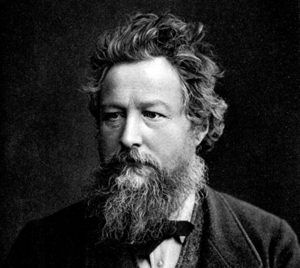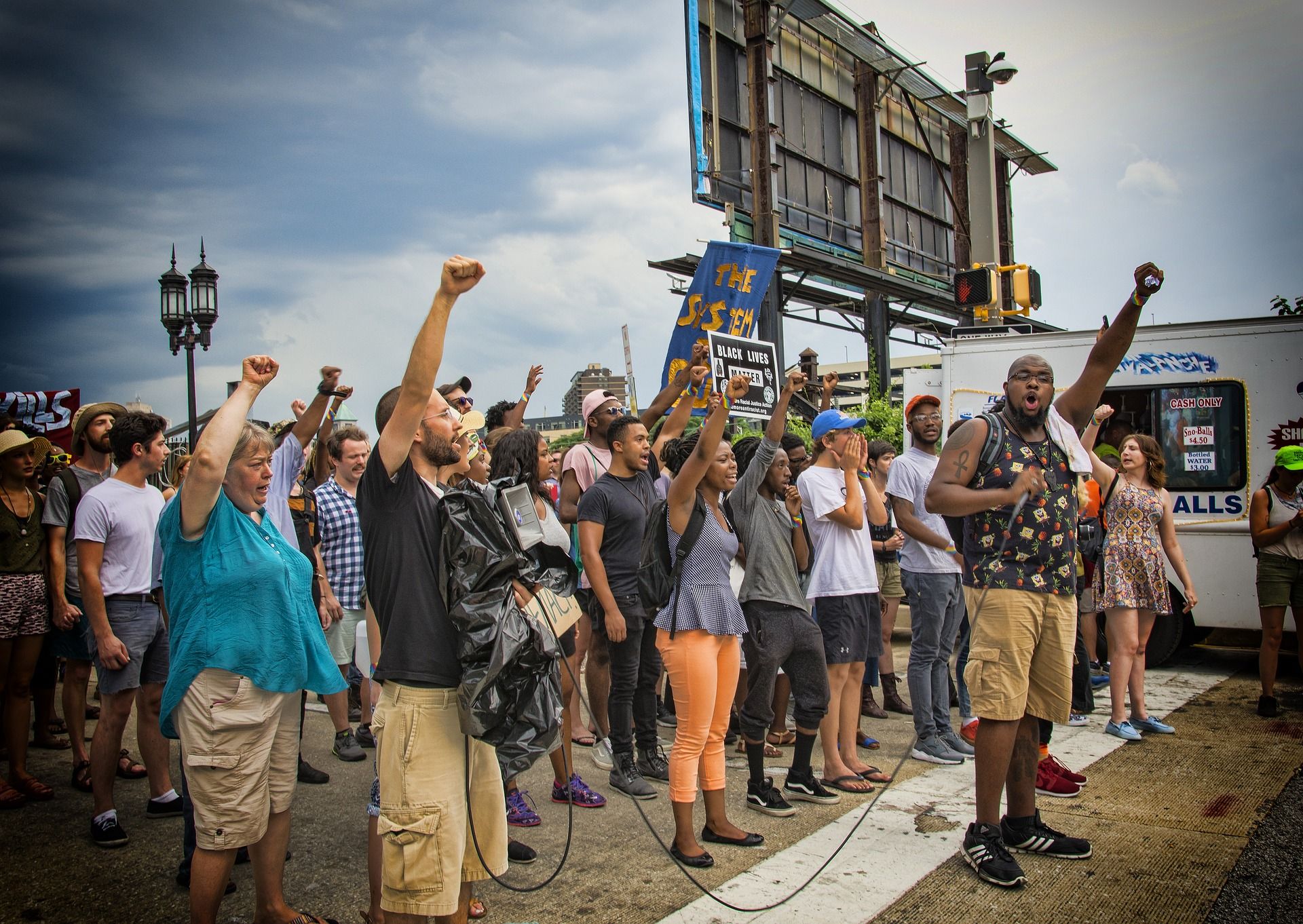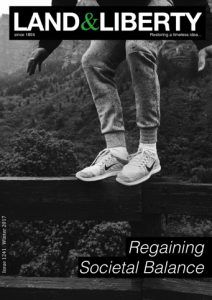George’s Revolutionary Christianity
“And do not be conformed to this world,
but be transformed by the renewing of your mind”
Romans 12:2
By Simom McKenna

Where is God?
If one quotes selectively from George’s works, one can easily mistake George for an atheist, such is the extent and ferocity of his non-conformism. Yet Christian wisdom informed George’s work to such a degree that some of his speeches, such as Thy Kingdom Come (1889), are more properly called sermons, delivered, as it was, with solemnity, in church, after prayer. There is no contradiction: Christianity was not a vocabulary he cunningly deployed to win votes from the faithful (unlike some latter-day Machiavellian-American Republicans), nor was it a quaint or merely incidental feature of his thought explained away by the phrase “historical conditions”. George was not simply a product of his time, he was a master. He knew the nature and cause of the wisdom and the civilisation in which he belived.
George was also an international celebrity, somewhat like Bernie Sanders or Pope Francis today. In traveling the world telling of his remedy, he would perhaps understand his mission as to “go therefore and make disciples of all the nations” (Mat 28:16), curing the social or moral sickness which caused land monopoly. Yet George also eulogised the industrial revolution, accepted evolution and mocked unexamined deference to authority. He even preferred atheist unbelief to the “blasphemy” of ignorantly sanguine Christianity, much like Jesus, who himself preferred the company of prostitutes and tax collectors to the spiritually corrupt Pharisees.
Yet, in the best possible way, he was also something of a wolf in sheep’s clothing. Despite so obviously appearing the modern gentleman, where it mattered – in his writings and especially in his public speeches – George was a revolutionary: socially (since he personally defied class and educational norms regarding the study of economics), economically (since the Single Tax challenged the economics of appropriation), spiritually (since he challenged atheists and believers) and scientifically (since he challenged the physical and ethical sciences). He was a revolutionary in the authentic and original meaning of the word. He called people to re-consider their thoughts and deeds and he called for a re-turn, a r-evolutionary movement towards the authentic source of universal justice. Faith and action intersect profoundly in his teaching of the “gospel of justice” which he believed to be the experience or ground of all religions. So, in high-Victorian Glasgow, he has its native people reconsider their city’s original dedication, truncated but 40 years earlier. “Let Glasgow Flourish by the teaching of the Word and the praising of Thy name” had become the secular “Let Glasgow Flourish”. In this way George prefigures the revolutionary nature of his message, asking its citizens to re-cognise their city’s original Christian mission. By invoking spiritual history and sacred teleology, he reminds them of what Glasgow was originally said to be for.
His was no dewy–eyed Christianity. With disarming frankness, George directly addressed the question of theodicy. In so doing, George challenged the congregation to ask how a good, all-powerful God could allow such terrible suffering in “His creation”. As even while they said the Lord’s Prayer together, in the same city,
“125,000 children of God [live] whole families to a single room […] Thy kingdom come! We have been praying for it and praying for it, yet it has not come…many think it will never come”
To which question George provides his answer rhetorically,
“What is the kingdom of God [if it is not] in the doing of God’s will […] by intelligent beings clothed in free will, intelligent beings knowing Good from Evil?”
George’s questioning is designed to arouse thought. His condemnation of complacent Christianity probably led to uncomfortable self-reflection among many who call themselves good Christians and it may have inspired many who attend but who found themselves unable to really believe in God in their hearts. His, “I say it with reverence” gently acknowledges this, but he does not turn away from this most pertinent and difficult of questions. Instead, it becomes a central theme of his sermon. This attempt to rescue from ignominy a tradition by a reinterpretation of its own sacred symbolism is, again, behaviour typical of a revolutionary in full command of his person, his audience and his message. In addressing one of the timeless critiques of religion – that God is, after all, absent – he raises questions that are of interest to all Christians, believers and non-believers alike.
The “Sacred Subject”
Disarmingly straightforward, George, citing Swedenborg, says we forsake heaven (good), choosing instead hell (evil). George’s remedy, expressed in personal-theological or existential terms, is to “pray with effect”, to dedicate our actions to heaven. For George, this dedication consists in understanding that an original intelligence pervades Creation, that this intelligence and its manifestations are good, just, lawful, beautiful and consistent. “Everyone is conscious of this” because we are by nature intelligent and like recognises like.
Despite belonging to different traditions, George’s phenomenology of intelligence resembles aspects of the political consciousness of “pagan” Aristotle’s zoon politicon (political animal). For Aristotle, mankind was not so much unique because he is a being potentially in possession of intelligence (since he, like George, thought intelligence pervades all being), but that this intelligence is unique on earth insofar as it is amenable to comprehending teleology and ontology, as evidenced by man’s general prowess in adaption, change or “progress”. For George, a central teaching of Christianity is that adapting means to ends is a gift (and responsibility) man has not only in the material and technological but also in the economic, social and moral realms. However, as Aristotle also knew, having potential does not guarantee such potential will be realised. Man is able to fall, descending and even adapting to beast-like states. He is also able to ascend and, in the best circumstances, as George and Christian theology would have it, man grows more recognisably into a likeness of the Creator, society to the Kingdom of Heaven. In the ancient Greek mythical tradition, Icarus was gifted with wings from his father, while in the Christian tradition, we receive from “Our Father” the perilous gift of an intelligence that can adapt means to any end, for any good or any ill.
This strange intimacy of lawfulness and gift, described analogically in the Icarus myth, is elucidated by George’s mediation on the prayer of prayers, from which comes the title phrase of his sermon. “Our Father” is the “All-Father” who gave Creation to all equally. But His creatures can obscure God’s perfect natural law with their own, until they come to the evil situation where “our laws say God’s earth is not here for the use of all his children, but only for the use of a privileged few!” This disjunction between human law and natural or God-given law is the “sacred subject” which continually informs George’s passion for justice.
The natural lawfulness of Creation articulated in the prayer of prayers provides a means by which to weigh the moral worth of man–made laws. Thus, George finds the late-Victorian understanding of justice to have become “legalised injustice”. Accordingly, any Christian who accepts injustice as “just how things are” denies Christ who taught, “we are all equal children of an Almighty Father”. If, by contrast, the manifest injustice of the suffering caused by private land monopoly were, as some Christians believe, “by His Decree”, George says he could “believe in no such God… If I did, though I might bend before him in fear, I would hate him in my heart”.
A “Monstrous Blasphemy”
 While we have to imagine George’s spoken delivery, the sermon itself demonstrates a genuinely transformative mode of speech one would expect of a revolutionary but which is sometimes reduced to “charisma” (Weber) or the “glamour of sincerity” (William Morris). But George’s knowledge and command of tradition is more than personal. He knew he was a critic of a certain attitudes to law just as Jesus was a critic of Judaic law when it was reduced to a showy tick-box exercise. Jesus exposed the cold-hearted injustice which masqueraded as virtue in the Jewish state. George himself indirectly makes the comparison, saying that Jesus would not have been persecuted had he not taught contrary to conventional opinions of justice. It is worth noting George was himself at that time subject to particularly scathing personal attacks from Socialists, Conservatives and former allies who had previously admired his “sincerity” but who now called him “TRAITOR!![sic]” (Morris).
While we have to imagine George’s spoken delivery, the sermon itself demonstrates a genuinely transformative mode of speech one would expect of a revolutionary but which is sometimes reduced to “charisma” (Weber) or the “glamour of sincerity” (William Morris). But George’s knowledge and command of tradition is more than personal. He knew he was a critic of a certain attitudes to law just as Jesus was a critic of Judaic law when it was reduced to a showy tick-box exercise. Jesus exposed the cold-hearted injustice which masqueraded as virtue in the Jewish state. George himself indirectly makes the comparison, saying that Jesus would not have been persecuted had he not taught contrary to conventional opinions of justice. It is worth noting George was himself at that time subject to particularly scathing personal attacks from Socialists, Conservatives and former allies who had previously admired his “sincerity” but who now called him “TRAITOR!![sic]” (Morris).
In deed and in intention, George’s spiritually transformative speech cleaved the same dangerous path as Christ and Aristotle – between knowledge of natural justice and merely human conceptions of justice. These latter type are rightly labelled “conventional” since they derive their authority from appearing to have “always been that way”, or, for example, being “just the way we do things in this country”. Of course, primary among these is the institution of private land ownership, which species of justice might be said to come from the much hallowed convention of “first come, first served” or of being “so written”. In merely human law, title deeds to land are all that is required for moral and legal recognition as authoritative proof of legitimate ownership which ownership, in the light of natural law, is a complete fiction since Creation belongs to God, and therefore equally to all and none.
The horror, injustice and absurdity of conventional moral law which allows for the private appropriation of wealth was captured in a popular story George told that evening in Glasgow. An old vicar dozing by the fire has a dream in which the Kingdom of Heaven has been divided up amongst now preeminent heavenly landlords, forcing newly admitted angels to sell their wings just to pay the rent. The story allows everyone to see how a simple inversion of “On earth, as in heaven”, if it took place “in heaven”, would absurdly replicate the immorality of conventional wisdom of “earth”. Interestingly, the narrative form of this tale has the same effect on the listener as the parables told by Jesus in the gospels. Thanks to the marvellous imaginative space created by narrative, in the telling and retelling of such tales, conventional morals and laws immediately appear inadequate (if not, simply wrong), contrary to the way things are by nature. The Good Samaritan, for instance, shows us the injustice of conventional notions of neighbourly duty, teaching us instead to regard firstly the person and their suffering, not the conventions of race, nationality or attending to business.
The considerable world-historical success of Christianity is also cited by George, and he clearly saw his mission in the same light. Christianity’s success, as he saw it, was secured by spreading the universal truth of foundational human equality “not necessarily of ability, but equality in opportunity”. This was possible because this universal truth was recognised as intuitively, demonstrably and naturally just. This is why George reserves his choicest condemnations for worldly Christians. Their moral pragmatism sanctions conventional injustice. Instead, Christians should accept the revealed natural justice which defined Christianity, and which differentiated it from all merely conventional wisdom.
Christians whose political economy was informed by the teaching of religion could not quietly tolerate private land ownership, unless they did not understand the ethical substance and historical significance of Christianity. To say the Single Tax is a true remedy, “but impracticable” is for George a “monstrous absurdity, a monstrous blasphemy!” The charge is legitimate since blasphemy consists in derogating the created as well as the Creator, supposing an essential disconnect between is and ought (as Hume did). George instead sees justice is possible because “His laws govern not merely the physical but the moral universe”.
We can now see the mature George’s main concern was not merely political or only economic. In Glasgow he chose to speak with Christians and unbelievers, not socialists and republicans or economists; not “business leaders” but community leaders. As we have seen, he received a lot of criticism for forgetting his socialist “comrades” and pursuing the “middle classes”, but both his critics and many of his supporters failed to grasp he was perusing justice at a higher level of knowledge. This knowledge transcends the separation of ethics and economics which is indicative of most modern thought (Milne). He was pursuing the people he believed most likely to have the moral education needed to recognise the legitimacy of natural justice which informs his analysis of the causes of poverty, and which logically imply the remedy. He intended to aid social evolution by reuniting society with the original Christian vision of natural equality before God by engaging those he considered to be responsible leaders of public good.
According to George, the gospel of justice is not confined to Christianity but common to all genuine accounts of natural justice. Thus, his sermon helps Christians move on from literal interpretations of Creation, while helping atheists to accept a properly rational teleology. Radically, even for today, he showed there was no conflict but in fact a lawful continuity between “adjustments in the animal kingdom” and a teleology of “intent”. George knew even those who deny the Creation or evolution (and those who believe both literally), will admit claws appear intended to aid climbing, as fins to propel though water. Thus adaption appears implicit in design.
Verbatim, this argument would probably not convince today. Today we speak instrumentally, saying claws and fins have a function, namely, ensuring survival. We evoke the watch sans watchmaker. If the watch made itself ex nihilo, it is of no practical consequence, since as rational beings we have to recon only with cause and effect, not origins or ends (Hobbes). Mere survival does not even require an end beyond itself. Thus, conventional modern social or anthropological theory is only suited to a purely materialist conception of life. A “bare life” defined by the opinion that morality beyond survival is optional or for each to decide for himself, within the limits of the “laws of the land”. Survival thus constitutes its own morality, as is it does in most obviously in Social Darwinism, but less obviously in economics. In modern economics and political thinking, “the economy” has achieved concreteness incongruous to its natural abstractness, effectively become its own end, having no beauty but its own internal logic, no morality beyond ensuring its own survival. This is why certain essentially abstract structures such as banks or certain loans are “too big to fail” while the Greek or British people are not big enough to matter, despite both the latter’s superior corporeality.
For many, morality is a social fiction or a luxury: vain glory (Hobbes), a personal imperative (Kant), a false consciousness (Marx), a repression of our animal nature (Freud). For George, these men suffer a willing blindness to the moral law evident in nature and conscience. He would remedy this blindness, since until men recognise the divine or natural justice and lawfulness of Creation, they will never really see why we should implement the Single Tax.
These later men are unable to see morality or existence in any non-Cartesian sense. All things moral are dismissed as merely “values” (not facts) caused, they imagine, by an oversupply of intellect they presume is perhaps most properly dedicated to devising personal pleasures and “commodious living”.
Thus, in late modern economic fundamentalism, a survivalist morality reins where Creation is stripped of moral intelligence. This means the spiritual wellbeing of mankind does not feature on any spreadsheet. As one resident of Grenfell put it, “people should never have been left to live like animals in shoeboxes”, and another, “it feels like our lives don’t matter”. These people know they have been condemned to a lesser life for being born poor. Yet, according to the narrative of modern materialism, progress will eventually mean suffering will have been abolished in some future state of ultimate progress (Kant). This means people alive now and for the foreseeable future will have to be reassured that their current economic disadvantage will eventually be remedied in the coming kingdom of late-industrial society (Marx, etc.). Thus, materialist philosophy has an eschatology so complicit with abject injustice “here and now” (and for the foreseeable future), it is as evil as the blasphemous Christian complacency George identified in church. With George, Christian eschatology is more radical and practical than the “never-never” usury of Marxist/liberal or Humanist eschatology. Ultimately, we see that any achievements (“progress”) of a kingdom of man will have to be weighed against interest paid by the lives of those lost on the way (“poverty”). A Christian eschatology, on the other hand, requires all suffering be accounted for, “every tear” (Teilhard).
Healing Homo-economicus
George must have seen that all economics, liberal, socialist or humanist, suffer the same fateful error he saw in sham Christianity. They share a blindness which manifests in an apathetic separation of ethics and economics. This apathy results from a materialist conventionalism which posits an irreconcilable dualism between the way things are conventionally and the way things are naturally. In the opinion of conventionalists, attempts to reconcile ethics and economics reveal an un-Enlightened or foolish innocence, equivalent in absurdity to a mystic attempting to defy gravity. It would be nice, they say, but it is not realistic, since people “are what they are” and society “is the way it is”. Meanwhile, they hope, some future technological innovation will save us from ourselves. Yet this “realism” means indescribable suffering now, for those unlucky enough not to be born into relative wealth, and relative suffering by those born well, but who have to endure the shame which naturally accompanies living in a society which encourages or forces people to profit from patent injustice.
Henry George’s remedy presupposes we correct our sciences of nature and ethics simply by recognising the lawful homogeneity of ethics and economics. His sermon is the speech act of awakening a transformational development in thought, since evolution from intelligent materialism to intelligent socialism is the necessary condition for the application of his remedy. He shows if we look at the phenomenon of life with undimmed eyes, we will no longer be unable to see how the lawfulness of community is as real as the lawfulness found in physics, nor will we be unable to articulate the responsibility of having to adapt our laws and behaviour as needed, to maintain natural equality in all regimes. As species have adapted with claws and fins, the social realm must also adapt or evolve, or die. George tells us the social realm has a plasticity the material realm does not, so by adapting or evolving conventions, behaviours and laws, we can easily retune our laws and institutions in light of the knowledge of natural justice and “intention”. But, as the last 140 years have shown, changing legislation is relatively easy, apprehending the unity of ethics and economics, however, is not. This change may indeed require the healing of the blind.
This article appeared in issue 1241 of Land & Liberty.
Download the whole issue:








